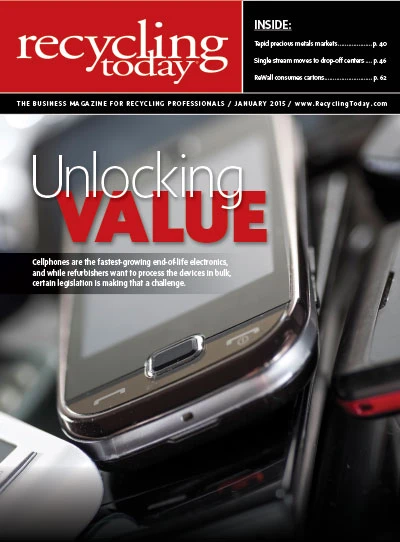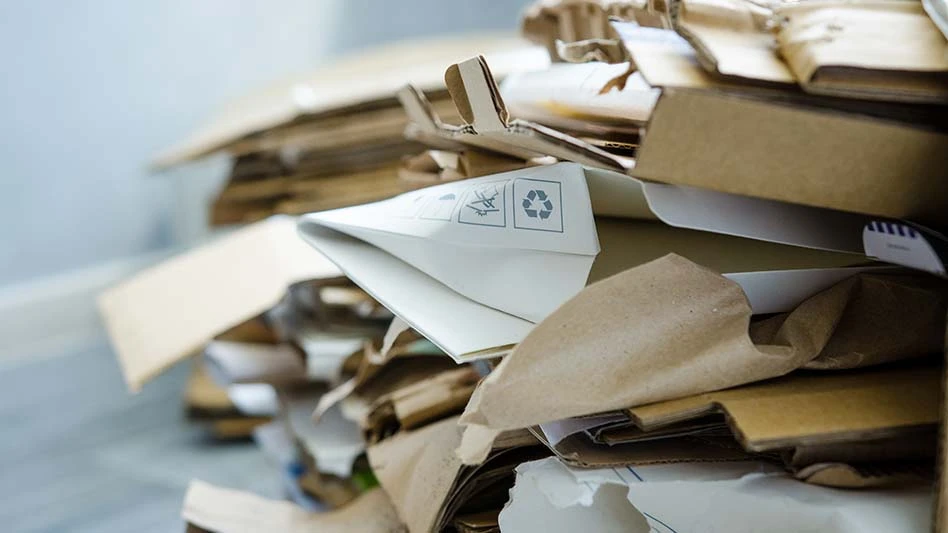 It is an exciting time to be involved in the aluminum market. At least that’s according to Kripke Enterprises Inc. (KEI) President Matt Kripke, who points to the growing use of aluminum in the automotive sector and an increased scrap supply as factors contributing to the commodity’s steady recovery in 2015.
It is an exciting time to be involved in the aluminum market. At least that’s according to Kripke Enterprises Inc. (KEI) President Matt Kripke, who points to the growing use of aluminum in the automotive sector and an increased scrap supply as factors contributing to the commodity’s steady recovery in 2015.
The 22-year-old nonferrous brokerage firm is based in Toledo, Ohio. KEI employs six traders and 17 additional people.
While 80 percent of the company’s business is brokered from point A to point B, Kripke says, its 50,000-square-foot warehouse stockpiles material for buying and consolidating mixed loads of scrap and sows. Aluminum grades account for about 95 percent of KEI’s volume, he says.
“In general, it’s a very exciting time in the aluminum side of the world,” Kripke says, adding, “The rest of the industry might be struggling currently, but with the automotive sheet and increased scrap supply, it’s exciting.”
One source told Recycling Today Editor Brian Taylor in the magazine’s December issue that aluminum demand from the auto industry could increase from 500,000 tons in 2014 to nearly 5 million tons by 2025.
Kripke says the overcapacity of auto shredders in the U.S. will lead to a renaissance in shredding and downstream sorting in light of the opportunity to realize additional profits. He predicts that in 10 years, a shredder’s downstream product will contain more aluminum sheet and that technology will become more sophisticated to allow operators to separate cast aluminum from aluminum sheet, increasing their profitability.
Kripke, who joined KEI two decades ago and accepted the role as president in 2012, shares more upcoming developments and factors affecting aluminum markets as well as how he conducts business as a nonferrous broker in the following Q&A.
Recycling Today (RT): What are the critical services that a broker offers to generators, small dealers and consumers of nonferrous scrap?
Matt Kripke (MK): Brokers provide a number of services to both dealers and consumers. Brokers who hedge like us are able to buy from dealers when the markets are high and sell to consumers when the markets are lower. In other words, we smooth out the market for all parties. For many of our customers, we help their cash flow by providing quick terms, and for consumers, we help their cash flow by allowing them to sell to us on their terms.
Our main benefit though to dealers is in helping them find the best markets for all of their scrap grades. They may sell direct to three or four consumers, but we sell to 30 or 40 consumers, so we know who the best home is for almost everything that gets thrown our way.
For our consumers, we make sure when we buy for them that we buy to their specifications (i.e., no boxes or other special packaging requirement, consistent alloys, etc.) and also find them large tonnages to help match their purchases to sales.
This is the scrap metal business; therefore, there are times when loads are not perfect. They get rejected or downgraded, and we provide solutions. As an example, we get a call from the mill, and the load has iron in it. I’ve heard rumblings that other people aren’t good at handling this. Before we call them and tell them the load is rejected, we line up up to three options. One option is: Do you want the load back? Then you get it back. Another option is: Do you want us to bring it to our warehouse in Toledo and clean it up? Because brokers are dealing with people all over the country, and we know people around each region, and I can call right now and say I got a local guy there who will inspect it for us. Working with a good broker should help you out in the event that they help to hold your hand and walk you through it.
RT: Do you focus on a specific region or are you working with customers nationally? How do you grow your network?
MK: We are domestic brokers serving North America primarily. The majority of our business takes place east of the Mississippi River, but we do buy and sell to and from the West Coast as well.
We grow our network through advertising in trade publications, such as Recycling Today and Scrap magazines. We get the majority of our growth through word of mouth, though. We get a lot of referrals from other dealers and from consumers.
RT: The value of aluminum in the central U.S., as measured by the Midwest Premium, has been elevated for much of this decade. What do you think are some of the fundamental reasons for this?
MK: The biggest drivers have been the difficult freight environment and the long queues to get prime material out of the warehouses.
We don’t study the Midwest too closely, but we certainly pay a lot of attention to it since the majority of our formula sales are based on this index.
A shortage in drivers and a shortage in trucks [have contributed to this elevation]. When the economy hit the skids, you had companies that went out of business and decided not to replace their fleets and let them die. Drivers who couldn’t get work went to other lines of work, not renewing their CDLs (commercial drivers’ licenses).
There seems to be more investment in trucking from what I’m hearing. Now that trucking will be improving, I’m hoping to work against that Midwest Premium.
RT: If China’s demand for imported nonferrous scrap declines dramatically, what are the likely effects on the U.S. nonferrous scrap market?
MK: The crossover items are the low-end grades of extrusions, but for the most part the main items China is buying in bulk are old sheet, tense, old cast and zorba. Sixty-63 new barrack extrusions are items that they can’t compete with because those go for a tight spread to the Midwest Premium.
This will mainly affect secondary grades of aluminum scrap and copper and brass scrap. Obviously, if there is less demand there, prices will be depressed here.
RT: Considerable investments are being made in the U.S. in heavy media and other nonferrous separation plants. In what ways, if any, does this offer an opportunity for a broker such as yourself?
MK: The better the nonferrous product coming out of these plants, the better it will be for brokers. We can find specialty markets for clean shredded MLC (mixed low copper) packages or shredded sheet or shredded cast. Currently, when it is all mixed as twitch, zorba or some other grade, it is primarily a secondary grade of scrap. Once you can separate the sheet from cast, and hopefully down the road separate different grades of sheet, it will open up many more consumers who will be willing to consume this product.
When they’re making a low-grade item, it can go to all of the secondaries that know what to do with the low-grade item. Fifteen years ago, the eddy current systems were just really ramping up. The people who were putting them in didn’t know what to do with that product at first, so it was an item that was brokered. We were brokering 10 to 15 loads a month of various quality of aluminum downstream byproduct. Then it became a very mature market. They knew where to go, and less of that material was going through brokers. We kind of stopped focusing on that because there wasn’t room for us in the middle for that product. The marketplace didn’t allow for that.
RT: At our Paper & Plastics Recycling Conference held in Chicago Oct. 8-10, 2014, a speaker in the “Keeping a Lid on Transportation” session said that trucking rates were up while a driver shortage continued. How have you been affected by the increased rates and lack of drivers?
MK: Through September (2014), our freight line on our statement is up over $400,000 from this time last year. The majority of that we are able to pass on to our dealers by buying cheaper or to our consumers by selling for more. But we still pay a big number each month to get critical loads moved. That is customer service and there is no way to recover that extra cost.
The freight issue is reducing profits for brokers, dealers and consumers. Everyone is struggling with it. Many of our consumers who try to run a tight inventory are really challenged by this. Trucks missing appointments is unfortunately a regular occurrence now. Our on-time pickup performance [at the end of October 2014] is around 80 percent, and we expect 90 percent. This has been a major challenge.
As brokers, we’re buying from a dealer and selling to a mill. I’d say 75 percent of the time, we’re handling the freight [and] dispatching the truck. And most of the time what we’re able to do is get the freight rate ahead of time or we already know it because it’s a lane we move consistently so we know what it should be. We’ve been forced when we put the deals together to sometimes build in a rate; if it’s a short $400 to $500 run, we take our chances. If you get held up, the rate isn’t going to go up by that much.
We have mixed markets for shredded cast, MLC and shredded segregated, and that’s where we have an opportunity. What we find as a broker is when it’s a lowest common denominator grade, we don’t broker a lot of that material. That’s not our niche. The dealers we love have a consistent five loads a month.
RT: As a relationship-based role, what are some pros and cons the Internet has played in how you conduct your company’s business?
MK: The Internet has been a tremendous tool for us. Our open-order-position report is on Google Docs, and we can all adjust it live. Our order processing system is hosted, so I can enter orders from the road and look up information easily. We utilize Skype for our staff meetings to bring in our Florida office. In terms of trading, it makes it easier to learn about our customers and consumers. Many of our deals are transacted over email or text messages, and it has made getting prices instantaneous. If everyone has access to the same information, you can only differentiate yourself as a broker by offering excellent service like us.
I don’t know how we did business without it. With online trading, which many people have tried to get off the ground, the reason it has trouble in the scrap world is every mill’s specs are slightly different and every dealer’s description of its package is different. With an email or phone call, you can get a lot of questions answered.
Megan Workman is associate editor of Recycling Today and can be contacted via email at mworkman@gie.net.

Explore the January 2015 Issue
Check out more from this issue and find your next story to read.
Latest from Recycling Today
- Electrolux commits to recycled content
- Duesenfeld system targets battery cell scrap
- Hyundai says it will make steel in the US
- APR announces Recycling Leadership Award winners
- Glass Half Full opens glass recycling facility in Louisiana
- AmpUp partners with Roundtrip EV
- Global Recycling Day event supports Pittsburgh school's recycling efforts
- President signs executive order on critical minerals






